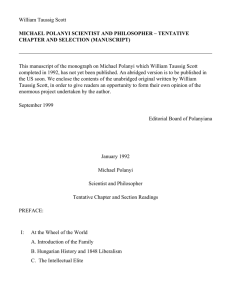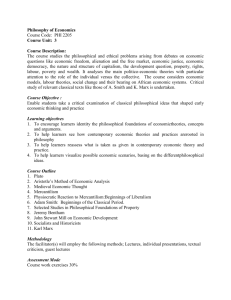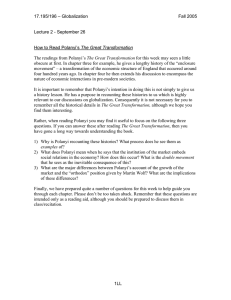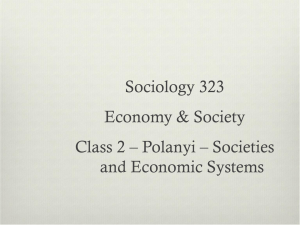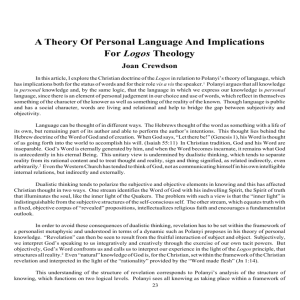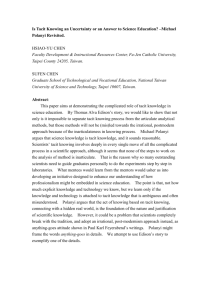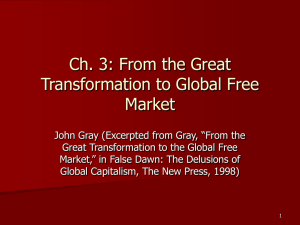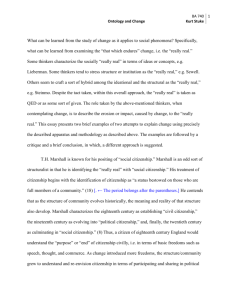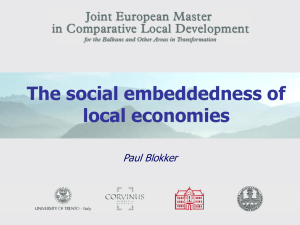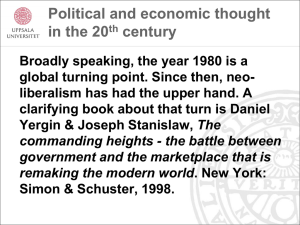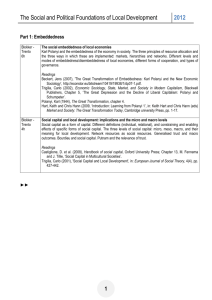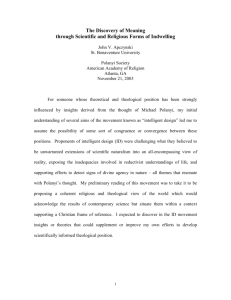Culture & Economy - Kari Polanyi Levitt
advertisement
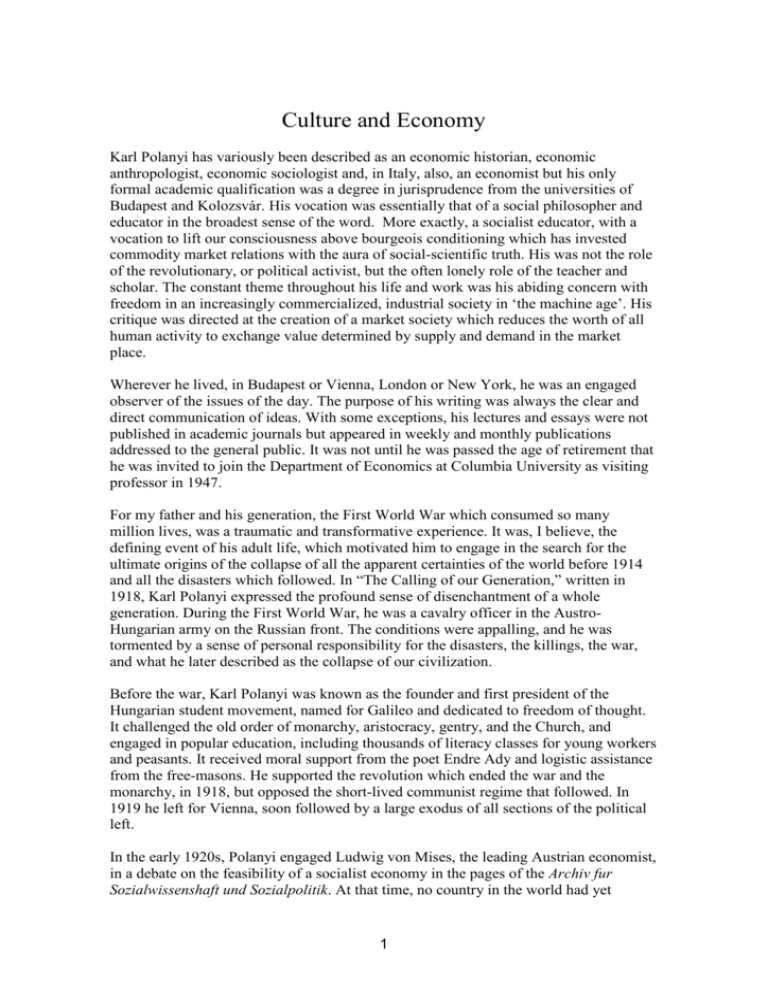
Culture and Economy Karl Polanyi has variously been described as an economic historian, economic anthropologist, economic sociologist and, in Italy, also, an economist but his only formal academic qualification was a degree in jurisprudence from the universities of Budapest and Kolozsvár. His vocation was essentially that of a social philosopher and educator in the broadest sense of the word. More exactly, a socialist educator, with a vocation to lift our consciousness above bourgeois conditioning which has invested commodity market relations with the aura of social-scientific truth. His was not the role of the revolutionary, or political activist, but the often lonely role of the teacher and scholar. The constant theme throughout his life and work was his abiding concern with freedom in an increasingly commercialized, industrial society in ‘the machine age’. His critique was directed at the creation of a market society which reduces the worth of all human activity to exchange value determined by supply and demand in the market place. Wherever he lived, in Budapest or Vienna, London or New York, he was an engaged observer of the issues of the day. The purpose of his writing was always the clear and direct communication of ideas. With some exceptions, his lectures and essays were not published in academic journals but appeared in weekly and monthly publications addressed to the general public. It was not until he was passed the age of retirement that he was invited to join the Department of Economics at Columbia University as visiting professor in 1947. For my father and his generation, the First World War which consumed so many million lives, was a traumatic and transformative experience. It was, I believe, the defining event of his adult life, which motivated him to engage in the search for the ultimate origins of the collapse of all the apparent certainties of the world before 1914 and all the disasters which followed. In “The Calling of our Generation,” written in 1918, Karl Polanyi expressed the profound sense of disenchantment of a whole generation. During the First World War, he was a cavalry officer in the AustroHungarian army on the Russian front. The conditions were appalling, and he was tormented by a sense of personal responsibility for the disasters, the killings, the war, and what he later described as the collapse of our civilization. Before the war, Karl Polanyi was known as the founder and first president of the Hungarian student movement, named for Galileo and dedicated to freedom of thought. It challenged the old order of monarchy, aristocracy, gentry, and the Church, and engaged in popular education, including thousands of literacy classes for young workers and peasants. It received moral support from the poet Endre Ady and logistic assistance from the free-masons. He supported the revolution which ended the war and the monarchy, in 1918, but opposed the short-lived communist regime that followed. In 1919 he left for Vienna, soon followed by a large exodus of all sections of the political left. In the early 1920s, Polanyi engaged Ludwig von Mises, the leading Austrian economist, in a debate on the feasibility of a socialist economy in the pages of the Archiv fur Sozialwissenshaft und Sozialpolitik. At that time, no country in the world had yet 1 constructed a socialist economy. The early Soviet Union was engaged in a civil war of survival. His socialism was neither that of traditional European social democracy, nor that of centralised communist planning. It was more akin to the third stream of the European socialist tradition—the populist, syndicalist, quasi-anarchist, and communalist one. Important influences included the cooperative vision of Robert Owen; the guild socialism of G.H.Cole; the ‘democratic functional socialism’ of the Austromarxist Otto Bauer; and Max Adler’s insistence on the socialist mission of the working class to raise the cultural level of society above the commercial ethic of the bourgeoisie. Polanyi admired the achievements of the Vienna Socialist municipal administration including the creation of social housing that was bright and modern and designed by some of the leading architects in Vienna. More than that, he valued the importance placed on the organization of a variety of cultural, educational and recreational activities. From 1924 until he left for England in 1933, his weekly column in Oesterreichische Volkswirt commented on the current international, political, and economic scene. In the political climate following the assassination of the Prime Minister by a Nazi, the suspension of parliament, and the impending conflict with organized labour and the social democratic party, in the autumn of 1933 Polanyi’s fulltime employment at the Oesterreichische Volkswirt was terminated and he left Vienna for London. He retained his position on the editorial board as a non-resident Director and continued to contribute to the journal until its dissolution in 1938, following the German annexation of Austria. In England he was associated with the Christian left and coedited Christianity and the Social Revolution. In 1936 he found employment with the Workers’ Education Association as a lecturer in small provincial towns of Kent and Sussex. He was shocked by the cultural impoverishment of the working class in England, the richest country of Europe, compared with economically impoverished, post-war Vienna. He was required to teach courses on contemporary international affairs and on English economic and social history. His research and lecture notes form the skeleton on which he constructed The Great Transformation. Although The Great Transformation was written at Bennington College, Vermont, from 1940 to 1943, it was in England that Polanyi found the origins of the disasters that befell Europe from 1914 to 1945. In the first part of the book he tracked attempts by the victorious Western powers to restore the old economic order, including the gold standard, in the ‘Conservative Twenties’, and the effects of the collapse of capitalism on the weaker defeated countries of Germany and regions of Austro-Hungary in the ‘Revolutionary Thirties’. These insights were gained from Polanyi’s central European perspective of smaller and weaker countries tied to the credit strings of the City of London and the Bourse of Paris and, ultimately, on Wall Street. Western creditors imposed austerity programs that demanded budget cuts, wiped out social programs, and dismissed public servants. They resembled the structural adjustment programs imposed by the IMF and World Bank on indebted Third World countries in the 1980s and 90s and, currently, the austerity measures demanded by international creditors from the countries of the Southern periphery of Europe from Greece to Portugal. In 1932, in Germany, with 5 million unemployed, Chancellor Brüning proudly announced that the government had balanced the budget, precipitating the political crisis that brought Hitler to office in January, 1933. In Italy, Austria, Spain, Portugal, Poland and other weakened, vulnerable countries of post-1918 continental Europe, Catholic fascist 2 regimes assumed office, used exchange controls to defend currencies and imposed tariffs and other economic protective measures. The lessons of this history for Europe at the opening of the 21st century are inescapable. In the closing passages of this account of the interwar years, Polanyi wrote; “In order to comprehend German fascism, we must revert to Ricardian England.” Like Marx before him, Polanyi located the origins of industrial capitalism in England. “The Industrial Revolution was an English event. Market economy, free trade, and the gold standard were English inventions.” The origins and the consequences of the liberal economic order which collapsed in 1914 “should be studied in the birthplace of the Industrial Revolution, England.” (Polanyi, 1944[2001]: 32) The favourable reception of The Great Transformation in the United States resulted in Polanyi’s appointment to Columbia University. There he taught a course in General Economic History and engaged in research on the substantive economy1 of primitive and archaic societies with the aid of his now well-known paradigm of reciprocity, redistribution, and exchange as forms of economic integration. His intention was not to provide academic economic anthropologists with an intellectual toy to explore ‘distant’ and esoteric cultures. It was rather to suggest that never in human history, or human experience, has the economy been uprooted or disembedded from its societal matrix as in the English Industrial Revolution, which opened the Pandora’s Box of exponential economic growth accompanied by exponential social dispossession. He found that “never before in human history has the principle of gain been elevated to the organizing principle of economic life” (Polanyi, 1947 [1968]: 43) and in no previous society were people permitted to fall into a state of destitution unless the whole society suffered famine or other disasters. His anthropological research was a gigantic detour in aid of proving that the 19th century market economy, better known as free-enterprise capitalism, was a ‘fateful error’, an historic aberration that threatens the future of mankind with destruction. The demise of ‘really existing socialism’ put new wind into the sails of policies of deregulation, privatisation, and liberalisation of trade and finance. It is no exaggeration to say that the post-communist restructuring of the international economic order is ruthlessly subordinating the human community to market forces seeking financial gain on a global scale. Like free trade and laissez faire in the 19th century, the construction of the free market economy of the 21st century has been instituted by deliberate governmental intervention. The more than 2000 ‘enhanced’ free trade and bilateral investment agreements negotiated by national and multi-national agencies, employing many thousands of highly-paid technocrats, has created a global network of legal obligations subordinating national governments to the global rule of financial and corporate capital. This project is accompanied by an economic discourse claiming universal benefits and the common good of humanity. The scientific validity of these claims is grounded in mathematical general equilibrium models produced in universities, think tanks, and governmental institutions. According to the “substantive definition” the economy is “the interchange with its natural and social environment, in so far as this results in supplying him with the means of material wants satisfaction.” Polanyi opposes this definition to the “formal” one, which is usually adopted by neoclassical economics. From the “formal” point of view, the economic behavior consists in “economizing” the use of scarce means for alternative ends: K. Polanyi, “The economy as Instituted Process”, in Trade and Market in the Early Empires, ed. by K. Polanyi, C.M. Arensberg e H.W. Pearson, Glencoe, Ill.: The Free Press, p. 243. 1 3 In Polanyi’s language, the imposition on the rest of the world of this radical AngloAmerican vision of the autonomy of market forces backed by measures to subordinate nations, peoples and communities to the priorities of investors, is a stark Utopia which threatens to unleash uncontrollable reactionary political forces. It is incompatible with democratic governance, cultural diversity and pluralism and the natural environment is now too fragile to be subjected to criteria of profitability. It is painfully clear that economics is not capable of guiding us safely through the 21st century. But, we cannot dismiss its power in maintaining the present economic order, however problematic we may know it to be. Albert Einstein, whose genius hastened the unlocking of the secrets of nuclear power, was tormented by the fear that “the creations of our mind shall be a blessing and not a curse to (hu)mankind.” Capitalist economies driven by individual gain have produced extraordinary economic growth but the accompanying societal and environmental destruction now threatens the existence of humanity. All the social sciences must—to use Karl Polanyi’s words—be “subjected to total reconsideration,” beginning with economics with its simplistic and deeply erroneous assumption concerning human nature and ‘man’ in society. Let me indicate briefly an agenda of three fallacies so we can attempt to repair the damage. Not that it will be easy given the power which can be, and has been mobilized to subject and ‘open up’ human societies to the dictates and dominance of capital over labour, of money over people. Fallacy No. 1: Homo Economicus The concept of a maximizing and minimizing individual motivated by the desire to get the most for the least effort by a calculus of ‘utility’ and ‘disutility’ is an fiction, but we have been socialized to behave as if this were indeed the nature of human beings. Putting it simply, greed and laziness have been enthroned as basic human motivations (called ‘real’ because they are ‘material’), whereas the human need for love, companionship, community, respect, creativity, a sense of purpose to the meaning of life, and harmony with nature are considered secondary (or ‘ideal’ because they are not believed to be essential to us as producers and consumers). Such a distortion of human behaviour is a consequence— and a necessity— of the universalization of commodity relations. Here the basic texts are the opening chapters of Marx’s Capital in which he so powerfully explains that behind the exchange of commodities lie social relations. From here Karl Polanyi derived the concept of the ‘fictitious’ commodities of labour, land, and money. But children are not conceived and nurtured because parents are creating the ‘supply side of a labour market.’ The Creator has not endowed us with fertile land, water or useful minerals to be bought, sold, or owned as private property. As for money and its price (interest), this was a social construct for the benefit of society, and all societies prior to ours considered it sinful and illegal to permit usurous interest by those with power to extract it. The truth is that humans are essentially social creatures. That must be the beginning of our reconstruction of the place of economy in society. The reality of society, as Karl Polanyi was so insistent upon, means more than the triviality that we live in society and cannot escape it. It means that within each of us is the need for the protection of a communal and social support system that accords us self-respect and dignity, and thus personal freedom. 4 Fallacy no. 2: Belief in Economic Determinism Economic Determinism is a philosophy shared by technocratic capitalism and by technocratic Marxism. It is the ideology of technocracy, which would have us believe that modern industrial society must universally and everywhere assume the particular characteristics which it acquired in its European and American manifestations. The laws of exchange which govern the capitalist economy are made out to be the general laws of society. Socialism as we knew it in its East European form suffered from the same European arrogance. So, writes Polanyi, economic determinism is as unacceptable from socialist as from capitalist ideologues, and the central question of man in society is “how to organize human life in a machine society.”2 Here lies the significance of Polanyi’s twenty years of research into economic anthropology from which he concluded, and I quote, that “[nothing] is more obvious to the student of anthropology than the variety of institutions found to be compatible with practically identical instruments of production.”3 It follows that economics must be dethroned as the king or queen of the social sciences. We must seek to reverse the trend to over specialization, to reintegrate the study of the individual in society, to understand the relationship between the manner in which our livelihood is secured, and the manner in which we in society organize the polity within the larger reality of the cultural matrix of each and every society. We must recognize that we are blessed in the diversity of our cultures, that we need the familiarity of our particular cultural milieu, and that it is humanly intolerable to be forced to live under alien cultural values. To me the paradise of the Garden of Eden, of biblical mythology, is the remarkable fortune of humankind on planet earth to be blessed with abundant variety in nature and culture. The dangers of eating of the fruits of the tree of knowledge are the fears expressed by Albert Einstein that we can, with knowledge untempered by morality, destroy the richness of human existence. Our science fiction points to the hell on earth that could await us in a world in which technocracy would triumph over humanity. Fallacy No. 3: Economic freedom = personal freedom To descend from the philosophical to the more immediately mundane, I would like to close by identifying a more obvious fallacy— the idea that economic liberalism and free enterprise is the way to expand personal freedom. This idea, which many of us believed was well and truly discredited, acquired a new life with the accession of Thatcher and Reagan to office in the 1980s. It has become the radical ideology of the Right. The roots of the idea go back to the era of the emergence of Europe from feudalism, and the cry that the peasant, not the landlord, should own the product of the sweat of his brow and the worker should have the right to the fruits of his labour. This was the original case for the rights of property over the rights of privilege of feudal tyrants. The extension of the principle of the rights of property to gigantic impersonal accumulators of capital— to transnational corporations and transnational banks— is totally unacceptable. The Western initiatives to open-up Third World societies to the unrestricted rights of foreign investors will be met, must be met, by strategies to protect the sovereign rights of nations and, more specifically, to dethrone the US dollar as the dominant reserve currency. 2 K. Polanyi, Our obsolete market mentality, 1947, in K. Polanyi: Primitive, archaic and modern economies, G. Dalton ed., Boston: Beacon Press, 1971, p. xx. 3 Ibid. Compare also: K. Polanyi, “On belief in economic determinism”, Sociological Review, 1947, vol. 37, no. 1, pp. 96-112; translated in the present volume, pp. … 5 The international economic and political order must proceed with due respect to the sovereignty of nations which are the political manifestations of modern cultural communities. In an effort to outline the basis of a viable and humane order of things, Polanyi identified what he called four vistas of a humanist socialism: 1. 2. 3. 4. Pluralist democracy, i.e. freedom within society. National independence, i.e. freedom from imperialist domination. Industrial culture, i.e. acceptance of modern technology. A socialist international order, i.e. the coexistence of different cultures and respect for national sovereignty. In this perspective, the nation remains the fundamental cultural as well as political unit of society. In a letter written in 1957, Polanyi argued: Few words in political sociology are so perverted as nation, national or nationalistic. After the feudal nation, came the bourgeois nation, which is now being superseded by the socialist nation. The essential connotation is always about the communion of humans. The heart of the feudal nation was privilege; the heart of the bourgeois nation was property; the heart of the socialist nation is the people, where collective existence is the enjoyment of a community of culture. I myself have never lived in such a society.4 But socialism, as Polanyi conceived it, must be redefined as beyond mere property terms. It must involve the deliberate subordination of the economy to the ends of the human community. Material needs and their satisfaction— the technology of production— are merely accessories to a tissue of society, a web of social relations which inhere in lives under humane conditions. We should not, cannot afford to be afraid of restoring morality to the social sciences. As Einstein, the greatest natural scientist of our era, warned, concern for man himself and his fate must always form the chief interest for all technical endeavours. For this we may not get rewards within the narrow confines of our academic institutions, but we can enjoy the satisfaction of having contributed a little trickle to a human stream that is asserting the will of life to conquer destruction and death. It is a tribute to the moral force of his spirit that Polanyi’s work has retained a freshness and a relevance which continues to speak to us across the seven decades which have passed since it was written. His work is ever more frequently cited. A re-reading of The Great Transformation comes across as an urgent appeal to associate in solidarity to protect communities, peoples and nations against the atomization of society and the cannibalization of the cultural and natural resources of the planet, by the rapacious forces of global capital markets. Karl Polanyi’s vision of a free, co-operative, democratic and just society based on social ownership and control of economic resources lives on because it is not grounded in technological or economic determinism. It was nourished by the indomitable human spirit that he so admired in Bakunin, Zasulich, and the other early Russian 4 Letter to Rudolph Schlesinger, prospective editor of the journal Co-existence, founded by Karl Polanyi in 1964. 6 revolutionaries—and all other rebels who confronted authoritarian power, including Jesus of Nazareth. His Christianity—at no time practised within the institution of any Church—was grounded in the communion of humans. Freedom, so central to his concerns throughout his life, was rooted within “the reality of society.” But the reality of society, and the constraints which this reality places upon the actions, values and ideas of all of us who inescapably live within society, do not release us from the responsibility to exercise freedom of action and thought and never to give in to determinism and fatalism. KARI POLANYI LEVITT Montreal, 2014 7
